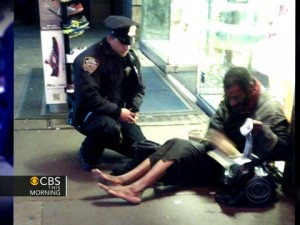A few years ago a popular bump sticker urged us to practice “random acts of kindness and senseless acts of love.” It’s a nice sentiment.
In Judaism, however, acts of kindness are not random and acts of love are not senseless. They are commandments from God. They are part of the moral structure of the universe. They are holy acts with reverberations beyond our imagination.
God is Everywhere
This lesson was taught most powerfully by a 17th century Jewish mystic named Isaac Luria. Soon after the world was formed, Luria taught, sparks of God spread themselves across it. They landed in flowers, trees, waters and human beings.
As a result, everything and everyone we see or touch contains a spark of God. We uncover those sparks, we release their spiritual power, when we follow God’s commandments. When we bless each other through kindness, through words, through service.
We saw this truth in action last week in New York City. It was captured on video by a tourist with a cell phone.
A police officer approached a homeless man on the street. He lowered himself and offered him a pair of all-weather thermal boots. A shoe store loomed in the background.
The police officer, it was later learned, had purchased the boots with his own money. The homeless man, he reported, “smiled from ear to ear” after getting the boots. “It was like you gave him a million dollars,” he said.
A few days later the video was posted on Youtube and became viral.
Why?
What makes the video so popular and inspiring? I think it is the unexpected nature of the act. We don’t assume to see such an act on the mean gritty streets of New York. We don’t expect them from a tough New York Police Officer.
To see it in such a place by such a man surprises us. It makes us think higher of human nature.
Part of the goal of faith is to cultivate those acts of kindness. To help turn random into habitual, to transform senseless into sacred. It does through through what it asks us to do and believe.
Word and Deed
Consider prayer: part of the reason we pray is to experience gratitude. Gratitude helps us recognize that what we have is not ours alone. It urges us not to take things for granted, not to feel entitled, but to share God’s bounty with others.
Now consider belief: a core belief of Judaism, of almost every religion, is to “love your neighbor as yourself.” The definition of “neighbor” is just the person that lives next door. It is our fellow human beings. It is the person lying on the street.
We may not share their religion or ethnicity. But we share their humanity. It is that humanity that draws forth our frequent acts of kindness and sacred acts of love.
By Evan Moffic,
Grow Spiritually. Inspire Yourself. Live a More Meaningful Life. Get Lots More from Rabbi Moffic


